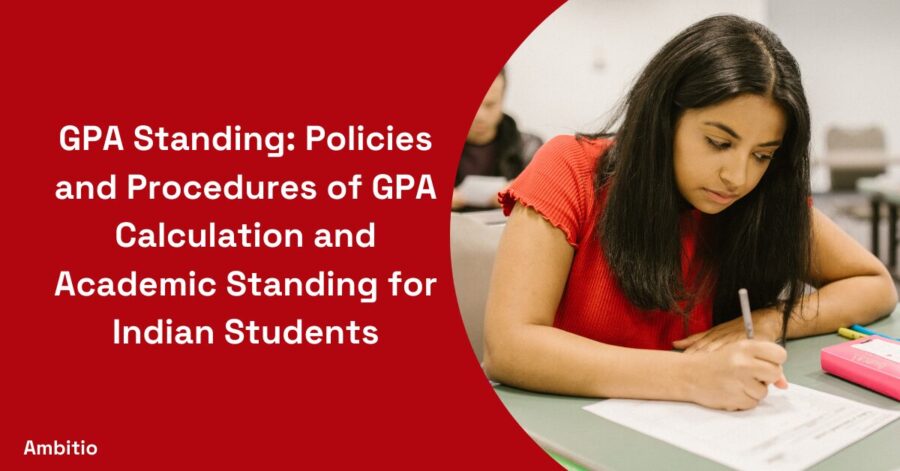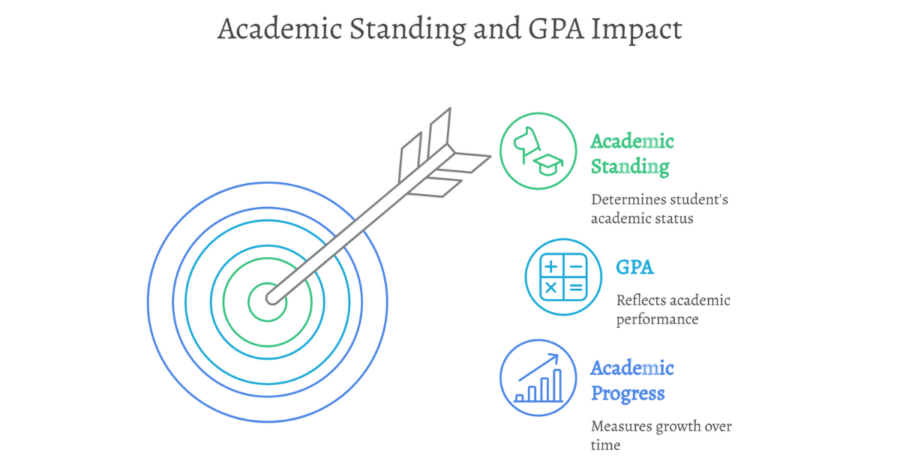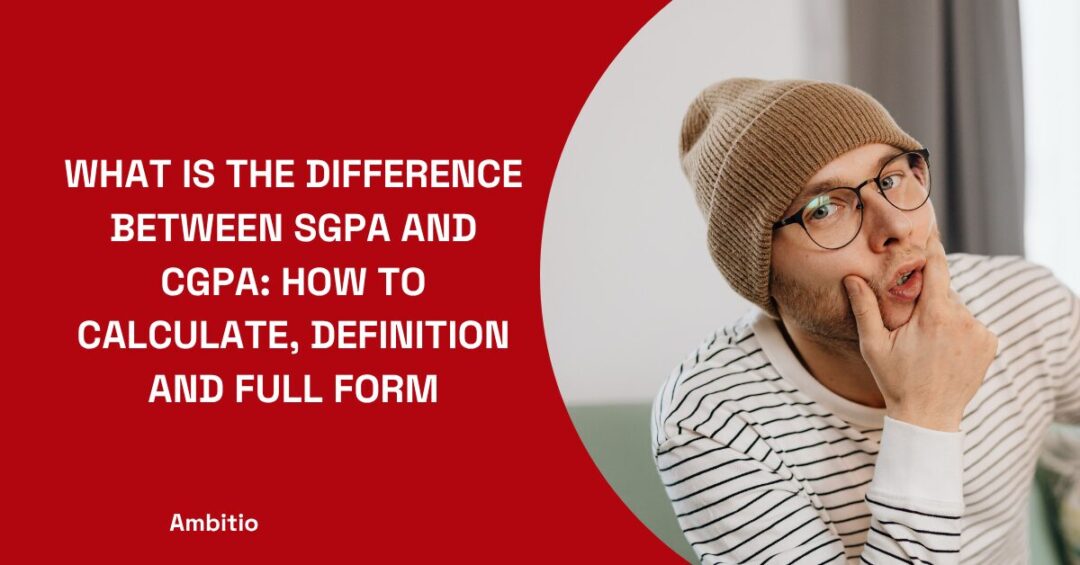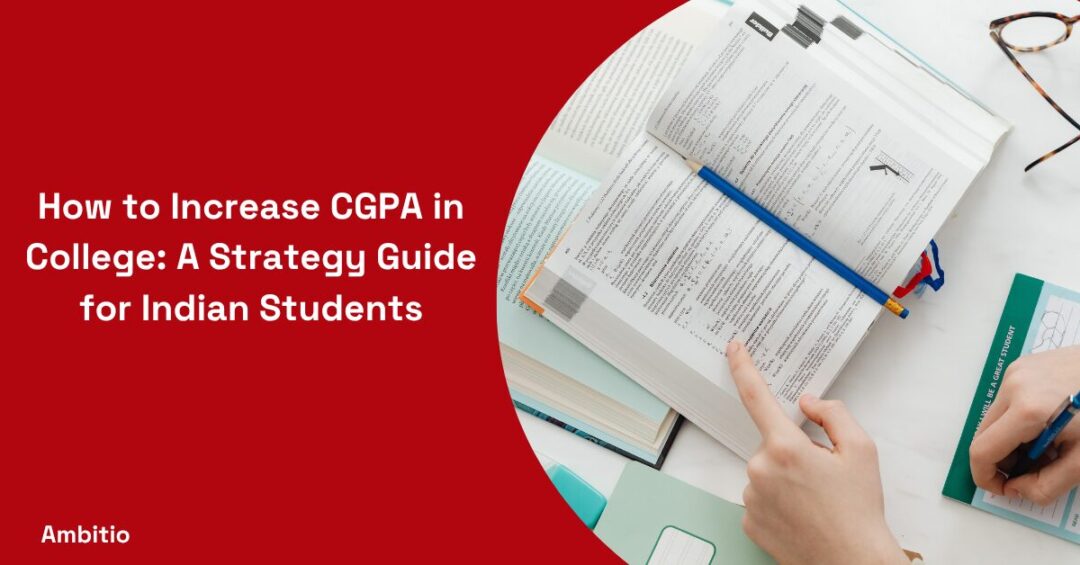3 May 2025
4 minutes read
GPA Standing: Policies and Procedures of GPA Calculation and Academic Standing for Indian Students

Key Takeaways
- GPA standing reflects your overall academic performance and is a critical metric for graduate school admissions.
- GPA standing can significantly influence eligibility for scholarships, assistantships, and competitive academic programs.
- GPA standing should be interpreted in context, considering course difficulty, grading scales, and academic trends over time.
Academic standing is stated to refer to a student’s academic standing depending on the academic performance in one term or on a series of terms. In the case of undergraduate students, academic standing determines whether a student can stay in good standing, be placed under academic probation, or get dismissed. Schools assess whether students should take corrective steps or academic interventions based on the combination of semester GPA, cumulative GPA, and academic progress.
Knowledge of your academic standing is essential in ensuring student success. When your GPA dips below 2.0, your academic status can be severely impacted, and might result in academic warning or academic dismissal.
What are the Types of Academic Standing for Undergraduates?
Here’s a breakdown of different academic standings commonly seen in universities:
| Academic Standing | Definition |
|---|---|
| Good Academic Standing | GPA of 2.0 or higher; student may continue enrollment without restrictions |
| Academic Warning | Early alert that GPA or performance is slipping |
| Placed on Academic Probation | GPA falls below 2.0; student must complete conditions to improve |
| Academic Dismissal | Removal from university due to continuous unsatisfactory academic progress |
How Does the GPA Calculation Happen?
Your GPA, or grade point average, is calculated based on the number of grade points earned divided by the total semester hours attempted. Universities may use a GPA calculating tools to automate this process. A term GPA represents performance for a single semester, while cumulative GPA reflects academic performance across all completed semesters.
GPA Calculation Table
Before looking into the table, it’s important to note that letter grades carry point values.

These contribute to your total GPA. The calculation is based on the formula:
Cumulative GPA = Total Grade Points Earned / Total Semester Hours Attempted
| Letter Grade | Grade Point Value |
| A | 4.0 |
| B | 3.0 |
| C | 2.0 |
| D | 1.0 |
| F | 0.0 |
You can use an online GPA calculator or the university student center to perform accurate GPA calculation.
Academic Probation and Academic Warning: Does it Lead to Academic Dismissal?
Being placed on academic probation means your cumulative GPA has dropped below 2.0. Students on academic probation must complete specific actions to regain good standing. These actions may include meeting with your academic advisor, scheduling tutoring sessions, or limiting course loads in future semesters.
Before panic sets in, know that many students recover from this phase. Below are strategies you can use:
- Schedule a meeting with your academic advising office
- Make an appointment with a tutor through student services
- Learn more about academic policies and procedures
- Enroll in courses that align with your strengths
- Withdraw from a course if it may affect your score further
Students must complete these steps usually within 10 business days of notification. Failure to do so could result in academic dismissal.
How to Return to a Good Academic Standing and Grade Point Average?
Students must achieve a GPA of 2 or higher at the end of the next semester to return to a decent academic standing. If not, they may remain on academic probation or face dismissal. Successful completion of enrolled courses, along with support services like tutoring, can help improve your transcript and total score.
If your GPA continues to fall below for two consecutive semesters, you may face academic dismissal. However, many universities offer a second chance through readmission or academic recovery programs. Students must submit an appeal form and explain the circumstances that led to poor performance.
Extenuating Circumstances That May Support an Appeal:
- Medical emergencies
- Family issues
- Financial hardship
If the appeal is approved, the student may have the opportunity to enroll under specific conditions to regain good academic standing.
How to Monitor Academic Progress and Ensure a Good Standing?
Universities offer tools like online GPA calculators, academic advising sessions, and transcripts to help students keep track of their academic record. Using these resources ensures satisfactory academic progress throughout your degree program.

Fun Fact: Did you know that the term “GPA” varies globally? While the USA uses GPA, other countries use different metrics. For example:
- UK: Honours classification
- Australia: Weighted Average Mark (WAM)
- Germany: 1.0 is top, 5.0 is fail
Students applying to Open University or international programs should check equivalency tools and test requirements like SAT, ACT, IELTS, TOEFL, GRE, or GMAT.
Conclusion
Your academic standing affects more than just your grades—it influences your enrollment, degree progression, and future opportunities. A GPA of less than 2.0 may result in academic warning, probation, or dismissal. But don’t lose hope. Universities provide multiple resources including support services, academic recovery plans, and advising to help you stay on track.
Understanding how your GPA is calculated and how it impacts your academic status is key to your academic success. Always seek help early, remain academically focused, and use available resources. If you find yourself in trouble, act fast and contact us through your student center or registrar. With effort and planning, you can return to good academic standing and achieve your goals.
Do you want your study abroad dreams to come true? Choose Ambitio and give wings to your dreams.
FAQs
What is a good GPA standing for graduate school admissions?
A good GPA standing for graduate school admissions typically ranges from 3.0 to 3.7, depending on the program and university.
How does GPA standing affect scholarship opportunities?
GPA standing directly impacts scholarship eligibility, as most merit-based scholarships require a strong academic track record.
Can work experience compensate for a low GPA standing?
In some cases, relevant work experience can offset a low GPA standing, especially if paired with a strong statement of purpose and test scores.
Does GPA standing differ between countries or education systems?
Yes, GPA standing varies globally; some countries use percentage systems or letter grades, which are converted during admissions review.
Should I explain my GPA standing in my application?
If your GPA standing is lower than required, it is advisable to explain it in your SOP or optional essay to provide context and show growth.
Is GPA standing the only factor for graduate program acceptance?
While GPA standing is important, universities also consider test scores, recommendations, personal statements, and extracurricular achievements.
Can I improve my GPA standing after graduation?
Although you cannot change your original GPA standing post-graduation, you can enhance your academic profile by taking additional courses or certifications.

You can study at top universities worldwide!
Get expert tips and tricks to get into top universities with a free expert session.
Book Your Free 30-Minute Session Now! Book a call now




























